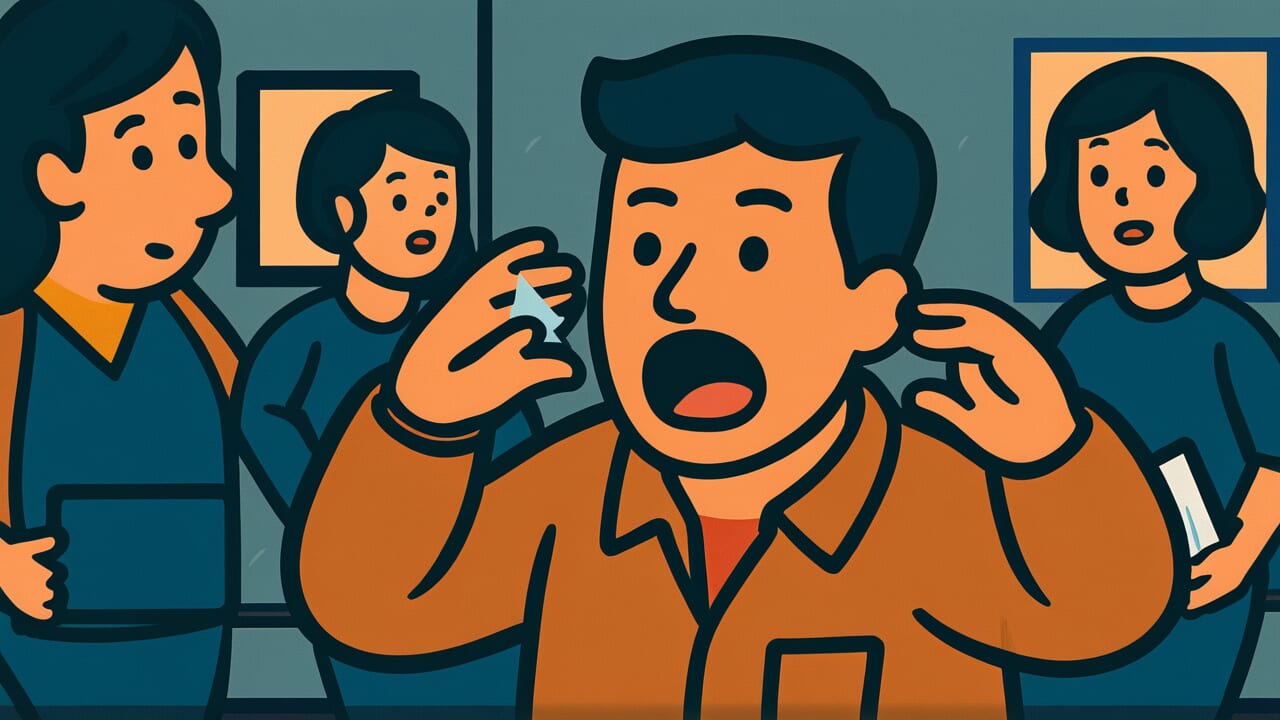How to Read “When the mouth moves, the hands stop”
Kuchi ga ugokeba te ga yamu
Meaning of “When the mouth moves, the hands stop”
This proverb warns about a common human tendency. People who talk too much often fail to follow through with actual work or action.
The original meaning teaches that talking and doing rarely happen at the same time. The more someone spends time chatting, the less their hands actually accomplish.
This saying applies to people who only discuss plans and ideals without taking action. It also describes those who make excuses and explanations while their work stalls.
You can also use it as a personal reminder. It helps you check whether you’ve gotten too absorbed in talking and forgotten what you should actually be doing.
The lesson remains relevant today. Meetings with endless discussion but no progress show this pattern. So does posting constantly on social media without taking real action.
This expression simply conveys the importance of balancing mouth and hands, words and actions.
Origin and Etymology
The exact first appearance of this proverb in literature remains unclear. However, its structure suggests it emerged from Japanese work culture as a teaching phrase.
The expression combines two contrasting body movements: “the mouth moves” and “the hands stop.” This creates a visual and easy-to-understand image.
It cleverly captures a physiological fact. The human body struggles to concentrate on multiple things simultaneously.
The choice of the word “yamu” (stop) deserves special attention. Rather than “tomaru” (come to a halt), using “yamu” emphasizes cause and effect.
It shows that talking causes work to stop as a result. The word choice itself demonstrates this causal structure.
This proverb likely originated from the wisdom of times when manual labor dominated. Agricultural work and craftsman tasks required constant hand movement.
It probably arose naturally as a warning to those who kept talking while their hands stayed idle at work. Its simplicity and clarity helped it spread widely through workplaces and homes.
This natural sharing led to its establishment as a common saying.
Usage Examples
- He’s always the type where when the mouth moves, the hands stop, so he constantly misses proposal deadlines
- They say when the mouth moves, the hands stop, so let’s end the chatting here and get back to work
Universal Wisdom
“When the mouth moves, the hands stop” reveals a fundamental human contradiction. Because we possess language, we often feel satisfied just by talking and postpone actual action.
Why do people spend so much time talking? Speaking gives us a certain sense of accomplishment. Discussing plans creates an illusion that we’ve already achieved them.
Pointing out problems makes us feel like we’ve done something. Humans have fallen for this psychological trick since ancient times.
Thinking deeper, talking is overwhelmingly easier than acting. It carries no risk of failure, requires no physical effort, and produces immediate results.
Actually moving your hands demands time and energy, with the possibility of failure. Humans instinctively choose the easier path.
So when the mouth moves and the hands stop, this might be natural human behavior in some sense.
This proverb has endured because it accurately captures this human weakness. The balance between words and actions remains a universal human challenge regardless of the era.
When AI Hears This
The human brain appears to process multiple things simultaneously. In reality, it just switches attention at high speed. The combination of language and movement especially causes serious congestion in the brain.
Speaking exhausts the brain more than you might imagine. You must think about what to say, choose appropriate words, construct grammar, and control pronunciation.
This entire process requires the prefrontal cortex, the brain’s command center. However, hand movements, especially precise tasks, also use this same prefrontal cortex.
In other words, both compete for the same processing unit.
Research shows human working memory can hold only about four items of information simultaneously on average. Conversing while doing manual work divides this limited capacity.
The brain must then prioritize, and one activity’s precision inevitably drops. Interestingly, as conversation content becomes more complex, hand movements slow down proportionally.
Conversely, when manual work gets difficult, conversation becomes monotonous or people stumble over words.
Furthermore, language processing involves the left brain’s language areas, while hand movement involves motor areas. These connect through neural circuits closely.
When one becomes active, blood flow and neurotransmitters to the other relatively decrease. The competition between mouth and hands isn’t just about attention.
It’s a matter of the brain’s physical resource allocation.
Lessons for Today
This proverb teaches modern people the importance of maintaining proper balance between words and actions. With social media and messaging apps, we now have more opportunities to “move our mouths” than ever before.
However, the essential truth remains unchanged. Posting and executing are different things.
I suggest developing a habit of “moving one step before speaking.” Before discussing the perfect plan, take one small step first. Before pointing out problems, execute one thing you can do yourself.
Simply reversing this order can dramatically change your life.
Of course, this doesn’t mean communication is unnecessary. What matters is asking yourself whether words are replacing action.
Are you satisfied just by talking? Do you feel you’ve fulfilled your responsibility by explaining?
Moving your hands provides learning that words cannot. Many things become clear only by actually trying them. Many skills develop only through experience.
Consciously create time to close your mouth and move your hands. Real growth exists in that quiet time.



Comments